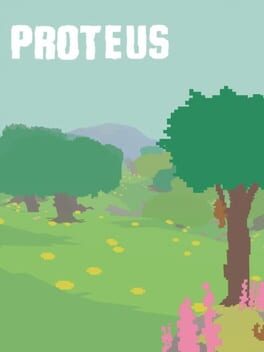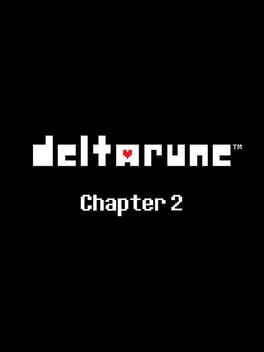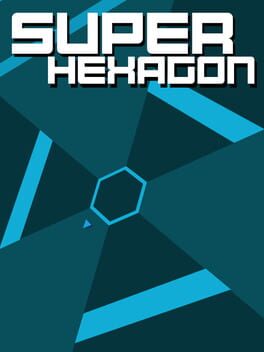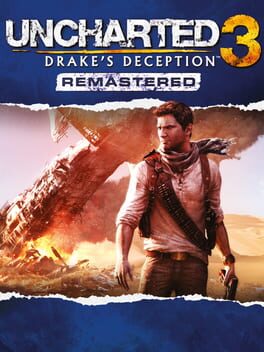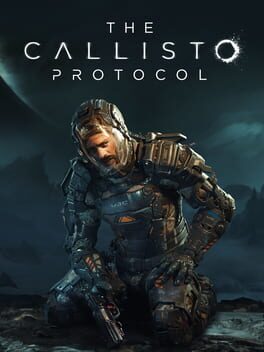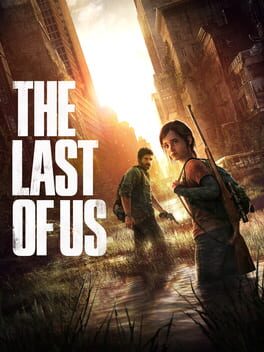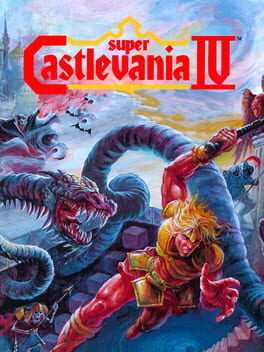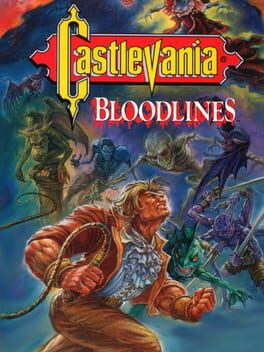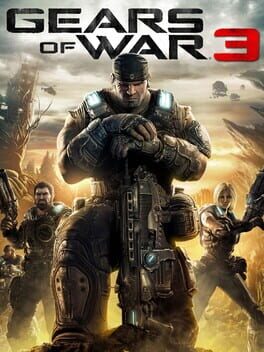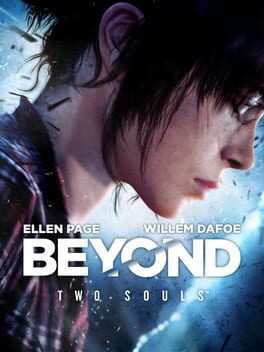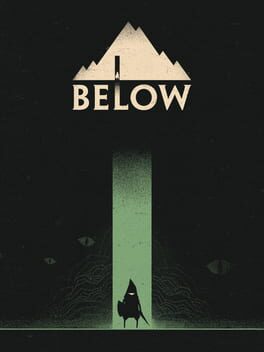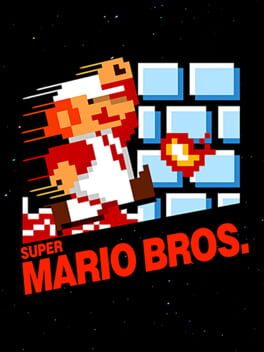2013
Estoy bastante seguro de que este juego va a seguir dando que hablar en el futuro, porque aunque pertenece a una época y escena artística concretas, ha sido el que más ha logrado atravesarlas con diferencia. Presentándose como poco más que una experiencia sensorial, esta obra es la culminación de multitud de trayectorias que algunos de los mejores artistas del medio venían experimentando desde mediados de los 2000. La reacción virulenta de artistas consagrados como Yahtzee Croshaw no hacen sino confirmar hasta qué punto este juego estuvo adelantado a su tiempo. Con nada más que la contemplación como tu único punto de agarre, este juego te obliga a hacer algo tan sencillo como dejarte llevar por los sonidos y los colores, y en un mundo tan agitado y convulso como el nuestro, eso se siente más revolucionario que cincuenta Braids de simbología pretenciosa.
------------------------------------------------------
I'm pretty sure that this game will still be talked about in the future because, despite belonging to a specific era and a certain art scene, it has been one of the only ones to surpass them. Presenting itself as little more than a sensory experience, this is the culmination of a multitude of trajectories that some of the best artists in the medium had been tweaking with since the mid-2000s. The vicious revolt against that established critics, such as Yahtzee Croshaw. had over it only confirms the extent of its success. With nothing but contemplation as your only tool, this game forces you to do something as simple as let yourself be carried away by sounds and colors, and in a world as hectic and convulsive as this, that feels more revolutionary than fifty Braids loaded with pretentious symbology.
------------------------------------------------------
I'm pretty sure that this game will still be talked about in the future because, despite belonging to a specific era and a certain art scene, it has been one of the only ones to surpass them. Presenting itself as little more than a sensory experience, this is the culmination of a multitude of trajectories that some of the best artists in the medium had been tweaking with since the mid-2000s. The vicious revolt against that established critics, such as Yahtzee Croshaw. had over it only confirms the extent of its success. With nothing but contemplation as your only tool, this game forces you to do something as simple as let yourself be carried away by sounds and colors, and in a world as hectic and convulsive as this, that feels more revolutionary than fifty Braids loaded with pretentious symbology.
2021
This review contains spoilers
I am going to try to collect my thought in some form of essay, but for the time being, I think Deltarune suffers because it tries to operate on three very different layers at the same time: one comes from the mechanics, another from the narrative and the last one from the metanarrative of it all.
The first layer tries to deepen the critique that Undertale already exposed by suggesting a combat system in which you wouldn't need to use the Fight command anywhere by making the Action as diverse and varied as possible. This means that, for all purposes, Actions now are akin to the decisions you make in a visual novel or a graphic adventure, which is fine, but makes framing these encounters as "fights" weirder and weirder. If we take into account that some of the Actions are understood by the narrative as acts of violence as well, then what purpose does setting this distinction make anymore? And considering that now there's a collectable element to sparing enemies, that makes the whole affair just another mechanical chore that hast lost all the bite it purported to have.
The second layer is probably the strongest, because it tries to convey an emotional truth through dialogue and characters that feel as charming and relatable as they were in Undertale. I said this before, but if I keep playing these titles is for the characters. But that poses an important problem, which is that basically I'm not allowed to know about some of these characters' more interesting traits if it's not by straining them out of the "good" path, which is still as rigid as before. Instead of creating a tantalizing moment in which I'm wondering whether to explore some part of Noelle's past or the other, I have to choose between a pre set "pacifist" route that morally obligues me to not knowing these characters unless I deliberately bring harm unto them.
Which brings us to the third and last layer, the metanarrative. Just like with Undertale, Deltarune tries to make a point about choosing to be a bad person in video games and suffering the consequences, and unlike the first chapter, it reaffirms the consequences of my actions and encourages me to suck them up. But I mus ask, what is the point of it now? Do I really need to be taught that there are better ways to play? In that case, why develop a whole system around a specific ability (the Ice Magic of Noelle) and its outcome? Just for the sake of it? Isn't that diametrically opposed to what the game purports to be about?
I think Deltarune is confused about which route to take, and in trying to do everything at the same time, suffers for it. I know why I'm playing it, but I'm bothered that it thinks that I'm doing it for the wrong reasons.
The first layer tries to deepen the critique that Undertale already exposed by suggesting a combat system in which you wouldn't need to use the Fight command anywhere by making the Action as diverse and varied as possible. This means that, for all purposes, Actions now are akin to the decisions you make in a visual novel or a graphic adventure, which is fine, but makes framing these encounters as "fights" weirder and weirder. If we take into account that some of the Actions are understood by the narrative as acts of violence as well, then what purpose does setting this distinction make anymore? And considering that now there's a collectable element to sparing enemies, that makes the whole affair just another mechanical chore that hast lost all the bite it purported to have.
The second layer is probably the strongest, because it tries to convey an emotional truth through dialogue and characters that feel as charming and relatable as they were in Undertale. I said this before, but if I keep playing these titles is for the characters. But that poses an important problem, which is that basically I'm not allowed to know about some of these characters' more interesting traits if it's not by straining them out of the "good" path, which is still as rigid as before. Instead of creating a tantalizing moment in which I'm wondering whether to explore some part of Noelle's past or the other, I have to choose between a pre set "pacifist" route that morally obligues me to not knowing these characters unless I deliberately bring harm unto them.
Which brings us to the third and last layer, the metanarrative. Just like with Undertale, Deltarune tries to make a point about choosing to be a bad person in video games and suffering the consequences, and unlike the first chapter, it reaffirms the consequences of my actions and encourages me to suck them up. But I mus ask, what is the point of it now? Do I really need to be taught that there are better ways to play? In that case, why develop a whole system around a specific ability (the Ice Magic of Noelle) and its outcome? Just for the sake of it? Isn't that diametrically opposed to what the game purports to be about?
I think Deltarune is confused about which route to take, and in trying to do everything at the same time, suffers for it. I know why I'm playing it, but I'm bothered that it thinks that I'm doing it for the wrong reasons.
2012
2018
To me, this was the equivalent of Christopher Nolan's Batman trilogy, in that it tries so desperately to give nuance and perspective to a franchise and concepts that the designers are pretty obviously embarrassed about, but don't have the courage to confront head on. As a result, the game feels like a cowardly attempt to revise the franchise's reputation in what ultimately is a pretty bland effort to make a game about smashing and beheading into a Last of Us lookalike. To compound things, they added an upgrade system that is utterly uninspired, and a companion that barely does anything because God forbid we run the risk of making Kratos' son mechanically annoying.
Overall, an incredibly spineless work. The fact that it received nothing but accolades probably means it's going to get more and more tone-deaf from here, so get ready for another Tomb Raider trilogy situation!
Overall, an incredibly spineless work. The fact that it received nothing but accolades probably means it's going to get more and more tone-deaf from here, so get ready for another Tomb Raider trilogy situation!
El último título oficial de la saga de Nathan Drake y el último juego de Naughty Dog antes de que entrara en la Era de Druckman y se volviera aún más pretencioso, inseguro de sí mismo y explotador, es también el título de Uncharted que se me ha hecho menos cuesta arriba. Claro que eso tampoco quiere decir que tenga muchas cosas buenas que decir sobre él. Desde el principio ha sido obvio que los juegos de esta saga aspiraban a recrear, en clave estética que no jugable, los altos vuelos de una película de aventuras y la grandiosidad del cine épico de Hollywood. Por el camino, seguramente, se esperaba que esta aproximación artística también crearía la misma profundidad filosófica o espiritual que una obra como En Busca del Arca Perdida o La Última Cruzada lograron alcanzar. Pero como siempre, lo que esta manera de imitar de forma tan servil ha demostrado una y otra vez desde principios de siglo es que, si te posiciones desde el principio como une artista endeuade a las tradiciones de otros medios, los resultados nunca traerán nada mejor que En Busca del Templo Maldito o La Calavera de Cristal.
El equipo guionista hace esfuerzos titánicos para que la fórmula funcione, y tal vez por eso esta historia me resulte la menos cargante de las tres (aunque me descubro echando de menos la simpleza del primer Uncharted, mucho más cercano a los Tomb Raider que mira tan por encima del hombro). Pero por el camino, el diseño de niveles se ha rendido por completo al formato de pasillos emperifollados a los que la franquicia siempre iba apuntando desde el principio. La relativa variedad que ofrecen los encuentros-arena queda siempre subordinada a la secuencia de acción más óptima: destruye siempre a los tanques, luego a los francotiradores, luego a los tipos con armadura y si acaso ya te vas encargando del resto a tu ritmo. El modo sigilo que aportará tanto dinamismo a The Last of Us aún es un proyecto a medio hacer. Y las secuencias de salto, como viene siendo habitual, son poco más que un ejercicio de saber a dónde apunta la cámara y saltar hacia allí. Lo único que nos queda por juzgar (más allá del extremadamente simple sistema de combate cuerpo a cuerpo) son las largas secuencias andando en las que el juego nos invita a adoptar un ritmo más lento, o pensar la solución a un puzzle, o dejarnos llevarnos por la historia. Y como ya he dado a entender antes, el esfuerzo es admirable en más de un aspecto, pero el impacto de estos caminos de baldosas amarillas queda en entredicho cuando cualquier actuación de carne y hueso aporta más energía que estas agotadas voces de doblaje y estos risibles conjuntos de polígonos animados.
Escribiré sobre esto de forma más fría, pero creo que mi principal observación de estos juegos, por lo menos ahora, es que son extremadamente anti-jugadore. En ningún momento dejé de sentirme como si estuviera interfiriendo el drama de instituto de une profesore de teatro, y aunque participar está bien, siempre acabé con un agujero en el estómago y, por qué no admitirlo, con un poquito de rencor por no haberme dejado improvisar.
------------------------
The last title of the Nathan Drake trilogy, and the last Naughty Dog game before it entered the Druckman Era and became more pretentious, self-conscious and exploitative than ever, it's also the Uncharted title that I've found to be the least tedious to finish. Of course, that's doesn't mean I have many good things to say about it. It's been always obvious that these games have aspired from the beginning to reach the same highs, at least aesthetically, of adventure movies like Raiders of the Lost Ark and epic movies like Lawrence of Arabia. It does feel like they hoped that by copying the surface elements of these movies they would be able, somehow, to reach the philosophical or spiritual depth that a work like The Last Crusade managed to achieve. But as always, what this slavishly imitative approach has proven time and again since the turn of the century is that, if you deliberately put yourself below the artistic heights of other media, you'll be only be able to achieve medioucre results that won't be that much better from Temple of Doom or The Kingdom of the Crystal Skull.
The writers here have made a herculean effort trying to make this work, though, and perhaps that's why I find this game to have the least annoying story of them all- though more and more I'm finding myself longing for the simplicity and Tomb Raider-esque approach that the first Uncharted took, despite obviously trying to distance from them. But along the way, however, the level design of the game has completely surrendered to the stripped down corridors format that they seemingly wanted to fall into. The variety offered by arena encounters is always resolved through the same sequence: always begin with the tanks, then the snipers, then the armored guys, and eventually you'll take care of the rest. The stealth mode that will bring so much dynamism to The Last of Us is still half-baked here. And the jump sequences, as usual, are little more than an exercise in knowing where the camera is pointing at and jumping there. The only thing left for us to judge (beyond the extremely simple melee combat system) are the long walking sequences in which the game invites us to slower our pace, or solving a puzzle, or ponder about the story. And as I've implied before, the effort is admirable on its own, but the impact of these yellow-bricked roads is undermined when any flesh-and-blood performance brings more energy than these exhausted voice-overs and laughable polygons.
I'll write about this more coldly, but I think my main contention with these games now is that they are extremely anti-player. At no point did I ever stop feeling like I was inside a teacher's high school theater project, and while participating was fine, I ended up confused and a little bit upset that they didn't let me improvise a little along the performance.
El equipo guionista hace esfuerzos titánicos para que la fórmula funcione, y tal vez por eso esta historia me resulte la menos cargante de las tres (aunque me descubro echando de menos la simpleza del primer Uncharted, mucho más cercano a los Tomb Raider que mira tan por encima del hombro). Pero por el camino, el diseño de niveles se ha rendido por completo al formato de pasillos emperifollados a los que la franquicia siempre iba apuntando desde el principio. La relativa variedad que ofrecen los encuentros-arena queda siempre subordinada a la secuencia de acción más óptima: destruye siempre a los tanques, luego a los francotiradores, luego a los tipos con armadura y si acaso ya te vas encargando del resto a tu ritmo. El modo sigilo que aportará tanto dinamismo a The Last of Us aún es un proyecto a medio hacer. Y las secuencias de salto, como viene siendo habitual, son poco más que un ejercicio de saber a dónde apunta la cámara y saltar hacia allí. Lo único que nos queda por juzgar (más allá del extremadamente simple sistema de combate cuerpo a cuerpo) son las largas secuencias andando en las que el juego nos invita a adoptar un ritmo más lento, o pensar la solución a un puzzle, o dejarnos llevarnos por la historia. Y como ya he dado a entender antes, el esfuerzo es admirable en más de un aspecto, pero el impacto de estos caminos de baldosas amarillas queda en entredicho cuando cualquier actuación de carne y hueso aporta más energía que estas agotadas voces de doblaje y estos risibles conjuntos de polígonos animados.
Escribiré sobre esto de forma más fría, pero creo que mi principal observación de estos juegos, por lo menos ahora, es que son extremadamente anti-jugadore. En ningún momento dejé de sentirme como si estuviera interfiriendo el drama de instituto de une profesore de teatro, y aunque participar está bien, siempre acabé con un agujero en el estómago y, por qué no admitirlo, con un poquito de rencor por no haberme dejado improvisar.
------------------------
The last title of the Nathan Drake trilogy, and the last Naughty Dog game before it entered the Druckman Era and became more pretentious, self-conscious and exploitative than ever, it's also the Uncharted title that I've found to be the least tedious to finish. Of course, that's doesn't mean I have many good things to say about it. It's been always obvious that these games have aspired from the beginning to reach the same highs, at least aesthetically, of adventure movies like Raiders of the Lost Ark and epic movies like Lawrence of Arabia. It does feel like they hoped that by copying the surface elements of these movies they would be able, somehow, to reach the philosophical or spiritual depth that a work like The Last Crusade managed to achieve. But as always, what this slavishly imitative approach has proven time and again since the turn of the century is that, if you deliberately put yourself below the artistic heights of other media, you'll be only be able to achieve medioucre results that won't be that much better from Temple of Doom or The Kingdom of the Crystal Skull.
The writers here have made a herculean effort trying to make this work, though, and perhaps that's why I find this game to have the least annoying story of them all- though more and more I'm finding myself longing for the simplicity and Tomb Raider-esque approach that the first Uncharted took, despite obviously trying to distance from them. But along the way, however, the level design of the game has completely surrendered to the stripped down corridors format that they seemingly wanted to fall into. The variety offered by arena encounters is always resolved through the same sequence: always begin with the tanks, then the snipers, then the armored guys, and eventually you'll take care of the rest. The stealth mode that will bring so much dynamism to The Last of Us is still half-baked here. And the jump sequences, as usual, are little more than an exercise in knowing where the camera is pointing at and jumping there. The only thing left for us to judge (beyond the extremely simple melee combat system) are the long walking sequences in which the game invites us to slower our pace, or solving a puzzle, or ponder about the story. And as I've implied before, the effort is admirable on its own, but the impact of these yellow-bricked roads is undermined when any flesh-and-blood performance brings more energy than these exhausted voice-overs and laughable polygons.
I'll write about this more coldly, but I think my main contention with these games now is that they are extremely anti-player. At no point did I ever stop feeling like I was inside a teacher's high school theater project, and while participating was fine, I ended up confused and a little bit upset that they didn't let me improvise a little along the performance.
Qué inmenso desperdicio. Un sistema de combate mal concebido aplicado a un sistema de niveles insípido, secuencias de sigilo completamente superfluas y una historia y caracterización que parece abrazar más que nunca la idea de "Resident Evil in Space" de la que Dead Space nunca se terminó de librar. Jugar a esto me ha hecho replantearme seriamente si la trilogía original de Schofield fue tan buena como recordaba, o si me dejé llevar por los pitos y flautas del momento. Es aún peor jugar a esto en la versión localizada, porque tienes a actores de calidad doblando escenas que claramente no tenían permitido ver, con lo que el tono se pierde completamente.
En un mundo ideal, esto habría sido el equivalente a Condemned que Monolith diseñó tras el éxito de F.E.A.R. Tal y como se ve ahora, es poco más que una demo técnica vistosa, pero apenas estable, de un ejercicio de soberbia artística.
----------------------
What a waste. A poorly conceived combat system applied to bland level design, completely superfluous stealth sequences, and a story and characters that seems to embrace more than ever the "Resident Evil in Space" premise that Dead Space never quite got rid of. Playing this has made me seriously rethink whether Schofield's original trilogy was as good as I remembered, or if I got carried away by the whistles. It's even worse to play this localized, because you'll have quality actors dubbing scenes they clearly weren't allowed to see, so the tone gets completely lost.
In an ideal world, this would have been the Condemned equivalent that Monolith delivered after the success of F.E.A.R. As it stands now, it's little more than a flashy but barely stable technical demo of an act of artistic hubris.
En un mundo ideal, esto habría sido el equivalente a Condemned que Monolith diseñó tras el éxito de F.E.A.R. Tal y como se ve ahora, es poco más que una demo técnica vistosa, pero apenas estable, de un ejercicio de soberbia artística.
----------------------
What a waste. A poorly conceived combat system applied to bland level design, completely superfluous stealth sequences, and a story and characters that seems to embrace more than ever the "Resident Evil in Space" premise that Dead Space never quite got rid of. Playing this has made me seriously rethink whether Schofield's original trilogy was as good as I remembered, or if I got carried away by the whistles. It's even worse to play this localized, because you'll have quality actors dubbing scenes they clearly weren't allowed to see, so the tone gets completely lost.
In an ideal world, this would have been the Condemned equivalent that Monolith delivered after the success of F.E.A.R. As it stands now, it's little more than a flashy but barely stable technical demo of an act of artistic hubris.
El juego más moralmente asqueroso que se ha hecho jamás. Trampa para incautos, adormecedor para perezosos, aturdidor para inquietos. Un dragón con piel de cordero que quiere hacernos creer que el videojuego nunca se bastará por sí solo.
----------
The most morally repugnant game ever made. A trap for the unwary, numbing for those who are lazy, stupefying for those who want to change things. A dragon disguised in a cute lamb's skin that wants to make us believe videogames will never be good enough.
----------
The most morally repugnant game ever made. A trap for the unwary, numbing for those who are lazy, stupefying for those who want to change things. A dragon disguised in a cute lamb's skin that wants to make us believe videogames will never be good enough.
2013
En 2020, jugué por primera vez a este juego bajo una espesa nube de expectativas: era un juego triple A, pero uno que dirigía sus esfuerzos a contar una historia que trascendía las limitaciones a las que los juegos categorizados con ese descriptivo se suele estereotipar; era un juego violento (como cualquier triple A), pero su violencia existía para explorar una faceta de la naturaleza humana; era un juego de padres protegiendo a hijas adoptadas, el tipo de historia que había aprendido a odiar tras Bioshock Infinite, pero era la mejor historia posible de un padre protegiendo a su hija adoptiva.
Cuando lo jugué, se me hizo corto, pero su DLC me dio esperanzas de que tal vez esto era el principio de algo mejor, de un mundo en el que los triple A por fin se utilizaban para algo más que ofrecer violencia y gratificación instantánea. Pero al cabo de poco tuvimos la segunda parte, que regresaba al principio de todo y lo volvía a repetir, y me di cuenta de algo: The Last of Us no puede ofrecerte nada más que promesas de un juego mejor. Puede prometerte una explicación de por qué recrea la violencia con tanto primor, pero nunca te la dará; puede que te jure que tratará de contarte la mejor historia posible, pero siempre te dejará en un punto y aparte; y puede que te insista una y otra vez en que es un triple A "bueno", de los que "valen la pena" jugar. Pero lo único que puede hacer para valerse por sí mismo es compararse con la literal escoria del medio. Porque no es capaz de hacer nada por sí mismo.
The Last of Us es una franquicia vacía, hecha por gente sin espíritu artístico alguno, y que fiel a su programa comercial de venderse una y otra vez a jugadores nuevos, sabe muy bien prometerte cosas pero nunca te las va a dar porque sabe, en el fondo, que no puede dártelas. Y, en el fondo, es porque no sabe hacerlo.
--------------------------------------------------------------
In 2020, I played this game with a mountain of expectations: it was a triple-A game, but one that directed its efforts towards a genuinely moving story that trascended its moniker; it was a violent game, but its violence existed to explore facets of human nature; it was a game about fathers protecting daughters, the kind of story that I'd learned to hate since Bioshock Infinite, but it was the best possible story of its kind.
When I finished it, it fell short, but its DLC gave me hope that maybe this was the beginning of something better, of the moment when triple-As were finally beginning to be used to tell something better. But not long after, we got the second part, and that game went back to the beginning and repeated everything as if nothing had happened. Then it dawned on me: The Last of Us can promise you a better game, but that's about it. It can promise you better uses of its violence, but it won't be able to; it swears that it's trying to tell you the best story it can, but won't be able to finish it; and it may insist over and over that it is a "good" triple A, the one that is "worth" playing. But the only thing it can do to defend its position is by comparing itself with the worst games ever. Because that's the bar it set out to pass, and nothing more.
The Last of Us is a nothing franchise, made by people without artistic spirit, and faithful to its capitalistic project of selling itself over and over again to new players. It knows very well how to promise you things but will never give them to you because, deep down, it knows it can deliver.
Cuando lo jugué, se me hizo corto, pero su DLC me dio esperanzas de que tal vez esto era el principio de algo mejor, de un mundo en el que los triple A por fin se utilizaban para algo más que ofrecer violencia y gratificación instantánea. Pero al cabo de poco tuvimos la segunda parte, que regresaba al principio de todo y lo volvía a repetir, y me di cuenta de algo: The Last of Us no puede ofrecerte nada más que promesas de un juego mejor. Puede prometerte una explicación de por qué recrea la violencia con tanto primor, pero nunca te la dará; puede que te jure que tratará de contarte la mejor historia posible, pero siempre te dejará en un punto y aparte; y puede que te insista una y otra vez en que es un triple A "bueno", de los que "valen la pena" jugar. Pero lo único que puede hacer para valerse por sí mismo es compararse con la literal escoria del medio. Porque no es capaz de hacer nada por sí mismo.
The Last of Us es una franquicia vacía, hecha por gente sin espíritu artístico alguno, y que fiel a su programa comercial de venderse una y otra vez a jugadores nuevos, sabe muy bien prometerte cosas pero nunca te las va a dar porque sabe, en el fondo, que no puede dártelas. Y, en el fondo, es porque no sabe hacerlo.
--------------------------------------------------------------
In 2020, I played this game with a mountain of expectations: it was a triple-A game, but one that directed its efforts towards a genuinely moving story that trascended its moniker; it was a violent game, but its violence existed to explore facets of human nature; it was a game about fathers protecting daughters, the kind of story that I'd learned to hate since Bioshock Infinite, but it was the best possible story of its kind.
When I finished it, it fell short, but its DLC gave me hope that maybe this was the beginning of something better, of the moment when triple-As were finally beginning to be used to tell something better. But not long after, we got the second part, and that game went back to the beginning and repeated everything as if nothing had happened. Then it dawned on me: The Last of Us can promise you a better game, but that's about it. It can promise you better uses of its violence, but it won't be able to; it swears that it's trying to tell you the best story it can, but won't be able to finish it; and it may insist over and over that it is a "good" triple A, the one that is "worth" playing. But the only thing it can do to defend its position is by comparing itself with the worst games ever. Because that's the bar it set out to pass, and nothing more.
The Last of Us is a nothing franchise, made by people without artistic spirit, and faithful to its capitalistic project of selling itself over and over again to new players. It knows very well how to promise you things but will never give them to you because, deep down, it knows it can deliver.
1991
If you are coming from the NES games, this feels like a downgrade in every aspect except in the visuals. Levels go one after another, but the enemies and the jumps remain the same for long periods of time. Since you are larger now, one would think this would be more about whipping and dodging, but you would be wrong! This game feels like it doesn't know what it wants to do and it's very frustrating!
Anyway, almost everything can be saved because it still feels nice to move and the aesthetic can be jaw-droppingly gorgeous. But I would recommend playing it before any other game if you're new to the franchise.
Anyway, almost everything can be saved because it still feels nice to move and the aesthetic can be jaw-droppingly gorgeous. But I would recommend playing it before any other game if you're new to the franchise.
2011
Acabo de dedicarle 3000 palabras esto en mi blog, y no me queda energía para explayarme como suelo hacer. Pero sí diré que, a nivel mecánico, este juego se siente como el más inseguro de los tres. Pequeños detalles, como que tengas que apretar el botón para recoger munición o ejecutar a enemigos convalecientes, dan a entender un estilo de pelea más metódico, y es cierto que casi todas las armas añadidas están pensadas para combate pesado y calculado. Pero creo que por el camino se ha perdido parte de esa rapidez y tensión que caracterizaba a los títulos anteriores. En cuanto a la historia, no tengo mucho más que decir, salvo añadir que, ahora más que nunca, tengo claro que estos juegos no son de tendencia fascista, como alguna gente parece ver, pero sí que se sienten resignados a un estilo de vida nihilista. Eso hace que, de todos los modos campañas, éste sea el que probablemente se sienta más miserable.
-------------------------------------------------
I just dedicated 3000 words to these games on my blog, and I don't have any stamina let to keep talking about them. But I will say that, mechanically, this game feels like the most insecure of the three. Small details, like having to keep pressing the button to pick up ammo or executing enemies, hint towards a more conservative fighting style. And it's true that almost all of the new weapons are geared towards slow and methodical combats. But I think that decision lost most the tension that came with the sense of speed that previous titles had. As for the story, I don't have much more to add, except to say that it's clear to me that these games are not explicitly fascist as some people have said. What they feel is resigned to nihilist worldview that could certainly be interpreted as fascistic. That made playing campaign mode, to me at least, a very miserable experience.
-------------------------------------------------
I just dedicated 3000 words to these games on my blog, and I don't have any stamina let to keep talking about them. But I will say that, mechanically, this game feels like the most insecure of the three. Small details, like having to keep pressing the button to pick up ammo or executing enemies, hint towards a more conservative fighting style. And it's true that almost all of the new weapons are geared towards slow and methodical combats. But I think that decision lost most the tension that came with the sense of speed that previous titles had. As for the story, I don't have much more to add, except to say that it's clear to me that these games are not explicitly fascist as some people have said. What they feel is resigned to nihilist worldview that could certainly be interpreted as fascistic. That made playing campaign mode, to me at least, a very miserable experience.
2013
El inevitable destino de una decisión artística equivocada, llevada a su extremo más ridículo. Donde Heavy Rain se presentaba como una propuesta de género con toques interactivos (que acababa disparándose su propio pie de pura incompetencia) Beyond se viste desde el principio como una Obra Seria que quiere hablar de Temas Serios ¿Qué Temas Serios? Elige ¡Los tenemos todos!
Bajo la montaña de chistes fáciles y derribos a su persona que David Cage (merecidamente) recibe, el señor y su equipo poseen una sensibilidad pulpera que tengo que admitir que me atrae. Heavy Rain supo mostrar, aunque fuera a ratos, ese talento del señor de Gruttola para recoger un género casposo y pasarlo por un par de pinceladas estilísticas. Un Night Shaymalan de mercadillo, podríamos decir. Pero ese potencial nunca se verá cumplido porque, incluso en sus mejores momentos (Fahrenheit, Omikron, una escena específica en Beyond) le puede el complejo y se ve obligado a disfrazar de oro lo que no pasa de pirita.
Aunque se trata de un estilo de juego denostado, el modelo de la "cinemática interactiva" ha dado muchas cosas buenas a lo largo del tiempo (pienso en Until Dawn como caso reciente y, mucho más atrás, me vienen a la cabeza los juegos de Tex Murphy y el grandioso Phantasmagoria 2) y su condición de género acomplejado es más culpa de quienes lo utilizan que del modelo en sí. Juegos como Beyond, con toda su pretensión de contar una historia madura repleta de tópicos de sensibilidad intelectualoide (la pobreza, los conflictos militares africanos, la marginación de los nativos americanos) acaba haciendo más mal que bien.
2013 fue una mierda de año entre esto, Last of Us y Bioshock Infinite. Vaya manera más patética de cerrar el ciclo de consolas de entonces y vaya presagio siniestro del que vendría después.
------------------------
The inevitable fate of a wrong-headed artistic path, taken to its horrible extreme. Whereas Heavy Rain presented itself as genre fare with some interactive elements (that crumbles out of sheer incompetence) Beyond: Two Souls wants to be immediately seen as a Serious Work that wants to talk about Serious Issue. What Serious Issues? Take your pick, we've got them all!
Underneath the mountain of easy jokes and dunks that David Cage (deservedly) receives, the man and his team possess a pulp sensibility that appeals to me at times. Heavy Rain was able to showcase, albeit briefly, Mr. Gruttola's talent for picking up a well-trod genre and elevate it with his particular touch. A second banana Night Shaymalan, we could say. But that potential will never be fulfilled because, even in his best moments (Fahrenheit, Omikron, a specific scene in Beyond) he is overcome by an inferiority complex and tries to reach highs that will never be reached.
Although this form of gameplay is generally mocked, the "interactive cutscene" model has made plenty of good things over the years (I'm thinking Until Dawn as a recent example, and the Tex Murphy games and Phantasmagoria 2 as earlier ones). The fact that it's so condescended today is more the fault of its participants than about the model itself. Games like Beyond, with its dedication towards telling a mature story with plenty of high-minded liberal topics (poverty, the Sudanese military conflict, the marginalization of Native Americans) ends up doing more harm than good.
Man, between this, The Last of Us and Bioshock: Infinite, 2013 was a really shitty year. What a pathetic way to cap on a whole generation of consoles, and what a sinister omen for what the next one would be about
Bajo la montaña de chistes fáciles y derribos a su persona que David Cage (merecidamente) recibe, el señor y su equipo poseen una sensibilidad pulpera que tengo que admitir que me atrae. Heavy Rain supo mostrar, aunque fuera a ratos, ese talento del señor de Gruttola para recoger un género casposo y pasarlo por un par de pinceladas estilísticas. Un Night Shaymalan de mercadillo, podríamos decir. Pero ese potencial nunca se verá cumplido porque, incluso en sus mejores momentos (Fahrenheit, Omikron, una escena específica en Beyond) le puede el complejo y se ve obligado a disfrazar de oro lo que no pasa de pirita.
Aunque se trata de un estilo de juego denostado, el modelo de la "cinemática interactiva" ha dado muchas cosas buenas a lo largo del tiempo (pienso en Until Dawn como caso reciente y, mucho más atrás, me vienen a la cabeza los juegos de Tex Murphy y el grandioso Phantasmagoria 2) y su condición de género acomplejado es más culpa de quienes lo utilizan que del modelo en sí. Juegos como Beyond, con toda su pretensión de contar una historia madura repleta de tópicos de sensibilidad intelectualoide (la pobreza, los conflictos militares africanos, la marginación de los nativos americanos) acaba haciendo más mal que bien.
2013 fue una mierda de año entre esto, Last of Us y Bioshock Infinite. Vaya manera más patética de cerrar el ciclo de consolas de entonces y vaya presagio siniestro del que vendría después.
------------------------
The inevitable fate of a wrong-headed artistic path, taken to its horrible extreme. Whereas Heavy Rain presented itself as genre fare with some interactive elements (that crumbles out of sheer incompetence) Beyond: Two Souls wants to be immediately seen as a Serious Work that wants to talk about Serious Issue. What Serious Issues? Take your pick, we've got them all!
Underneath the mountain of easy jokes and dunks that David Cage (deservedly) receives, the man and his team possess a pulp sensibility that appeals to me at times. Heavy Rain was able to showcase, albeit briefly, Mr. Gruttola's talent for picking up a well-trod genre and elevate it with his particular touch. A second banana Night Shaymalan, we could say. But that potential will never be fulfilled because, even in his best moments (Fahrenheit, Omikron, a specific scene in Beyond) he is overcome by an inferiority complex and tries to reach highs that will never be reached.
Although this form of gameplay is generally mocked, the "interactive cutscene" model has made plenty of good things over the years (I'm thinking Until Dawn as a recent example, and the Tex Murphy games and Phantasmagoria 2 as earlier ones). The fact that it's so condescended today is more the fault of its participants than about the model itself. Games like Beyond, with its dedication towards telling a mature story with plenty of high-minded liberal topics (poverty, the Sudanese military conflict, the marginalization of Native Americans) ends up doing more harm than good.
Man, between this, The Last of Us and Bioshock: Infinite, 2013 was a really shitty year. What a pathetic way to cap on a whole generation of consoles, and what a sinister omen for what the next one would be about
2018
Juegos como Below nos invitan a plantearnos qué tipo de vacío tuvo que revelar Dark Souls en el corazón de les jugadores para que se lanzara toda una escuela de roguelikes inspirada en su modelo. Below cumple, a nivel superficial, con todas las expectativas: exploración de tierras desconocidas y abandonadas, cercanía siempre amenazante de la muerte, y un mundo hostil e indiferente al que no nos ata nada que no sea el deseo de controlarlo y (spoilers para el final) acabar con él.
Below cumple con todas las marcas prototípicas del Soulslike, pero añade un par de elementos que lo diferencian radicalmente. El primero es que los controles y el combate son mucho más sencillos, mucho más cerca de un Zelda que de otra cosa. Con ese esquema, la sensación de peligro se ve menos acrecentada por los enemigos y más por las trampas del mundo, que se sienten verdaderamente crueles y malintencionadas de un modo que la premeditada y controlada indiferencia de los Souls nunca evoca. El segundo es que, cuando morimos, uno de nuestros compañeres/descendientes ocupa nuestro lugar de inmediato. En los niveles más complicados y severos, esto da a Below una capa de gestión cruel sobre mandar a tu gente a morir mientras recoges los fragmentos almacenas las armas más potentes. Ni siquiera Darkest Dungeon te invitaba a ver a tus avatares de una forma tan inhumana.
En resumen, diría que este juego es muy logrado, pero frustrante de un modo que no termina de conectar conmigo. Irónicamente, el elemento que más me desconectó fue la necesidad de grindear para la última sección de la mazmorra.
----------------------
Games like Below invite us to ask what kind of void did Dark Souls reveal to players so that many roguelikes would try to fill it in later years. It superficially meets all the expectations of the genre: exploration of unknown, desolated lands, the looming closeness of death, and a hostile and indifferent world that means nothing to us except how can we control it (spoilers for the end) finish it.
Below checks every proverbial Soulslike checkmark, but has a couple of elements radically set it apart. The first is that the controls and combat are much simpler, closer to Zelda than anything else really. With those mechanics the sense of danger is incentivized less by enemies and more by the traps, which feel truly cruel and malicious in a way that the Souls titles never attempt to evoke. The second is that when we die one of our companions/descendants will take our place. In the more difficult areas, this gives Below a layer of cruel management vibe about sending people to their death while you collect the shards and stash the better weapons. Not even Darkest Dungeon invited you to view your avatars so inhumanly.
To sum up, I would say that this game accomplished everything it set out to do, but frustrating in a way that didn't connect with me. Ironically, the element that turned me off the most was the need to grind for the last section of the dungeon.
Below cumple con todas las marcas prototípicas del Soulslike, pero añade un par de elementos que lo diferencian radicalmente. El primero es que los controles y el combate son mucho más sencillos, mucho más cerca de un Zelda que de otra cosa. Con ese esquema, la sensación de peligro se ve menos acrecentada por los enemigos y más por las trampas del mundo, que se sienten verdaderamente crueles y malintencionadas de un modo que la premeditada y controlada indiferencia de los Souls nunca evoca. El segundo es que, cuando morimos, uno de nuestros compañeres/descendientes ocupa nuestro lugar de inmediato. En los niveles más complicados y severos, esto da a Below una capa de gestión cruel sobre mandar a tu gente a morir mientras recoges los fragmentos almacenas las armas más potentes. Ni siquiera Darkest Dungeon te invitaba a ver a tus avatares de una forma tan inhumana.
En resumen, diría que este juego es muy logrado, pero frustrante de un modo que no termina de conectar conmigo. Irónicamente, el elemento que más me desconectó fue la necesidad de grindear para la última sección de la mazmorra.
----------------------
Games like Below invite us to ask what kind of void did Dark Souls reveal to players so that many roguelikes would try to fill it in later years. It superficially meets all the expectations of the genre: exploration of unknown, desolated lands, the looming closeness of death, and a hostile and indifferent world that means nothing to us except how can we control it (spoilers for the end) finish it.
Below checks every proverbial Soulslike checkmark, but has a couple of elements radically set it apart. The first is that the controls and combat are much simpler, closer to Zelda than anything else really. With those mechanics the sense of danger is incentivized less by enemies and more by the traps, which feel truly cruel and malicious in a way that the Souls titles never attempt to evoke. The second is that when we die one of our companions/descendants will take our place. In the more difficult areas, this gives Below a layer of cruel management vibe about sending people to their death while you collect the shards and stash the better weapons. Not even Darkest Dungeon invited you to view your avatars so inhumanly.
To sum up, I would say that this game accomplished everything it set out to do, but frustrating in a way that didn't connect with me. Ironically, the element that turned me off the most was the need to grind for the last section of the dungeon.
1985
2013
Ya sabemos que este juego es malo. Si no lo sabes, es porque acabas de teletransportarte desde 2013 hasta hoy, no has jugado a nada en años o eres Jeff Green.
Lo interesante de este juego no es su aburrida jugabilidad, su falta total de ritmo, su asquerosa visión política o su apenas camuflada misoginia. Es el hecho de que hubiera tanta gente dispuesta a obviar estas cosas para disfrutar los paisajes que le ofrecía Columbia, o contemplar la excusa que Elisabeth presenta como personalidad, o filosofar sobre elecciones y realidades alternativas. Los principios de los 2010 fueron realmente malos a la hora de buscar introspección en el medio. O a lo mejor no lo fueron tanto, porque Irrational jamás se recuperó tras esto, así que a lo mejor todo fue bien al final.
-----------------------------------------------------------------------
You already know this game is bad. If you don't, you're either coming through a warp hole from 2013, haven't played it in years and don't remember how bad it actually was, or you're Jeff Green.
At any rate, the interesting thing about this title isn't its boring gameplay, its lack of any sense of rythm, its disgusting politics or its barely veiled misogyny. It's the fact that so many people were eager to jump over these elements for them to admire Columbia's landscape or gawk at Elisabeth's pathetic excuse of a personality, or wax philosophically about choice and alternate timelines. The early 2010's were truly dire when it came to actual instropection in the gaming landscape. Or maybe they weren't, because Irrational never recovered after this flop, so maybe everything ended well in the end.
Lo interesante de este juego no es su aburrida jugabilidad, su falta total de ritmo, su asquerosa visión política o su apenas camuflada misoginia. Es el hecho de que hubiera tanta gente dispuesta a obviar estas cosas para disfrutar los paisajes que le ofrecía Columbia, o contemplar la excusa que Elisabeth presenta como personalidad, o filosofar sobre elecciones y realidades alternativas. Los principios de los 2010 fueron realmente malos a la hora de buscar introspección en el medio. O a lo mejor no lo fueron tanto, porque Irrational jamás se recuperó tras esto, así que a lo mejor todo fue bien al final.
-----------------------------------------------------------------------
You already know this game is bad. If you don't, you're either coming through a warp hole from 2013, haven't played it in years and don't remember how bad it actually was, or you're Jeff Green.
At any rate, the interesting thing about this title isn't its boring gameplay, its lack of any sense of rythm, its disgusting politics or its barely veiled misogyny. It's the fact that so many people were eager to jump over these elements for them to admire Columbia's landscape or gawk at Elisabeth's pathetic excuse of a personality, or wax philosophically about choice and alternate timelines. The early 2010's were truly dire when it came to actual instropection in the gaming landscape. Or maybe they weren't, because Irrational never recovered after this flop, so maybe everything ended well in the end.
